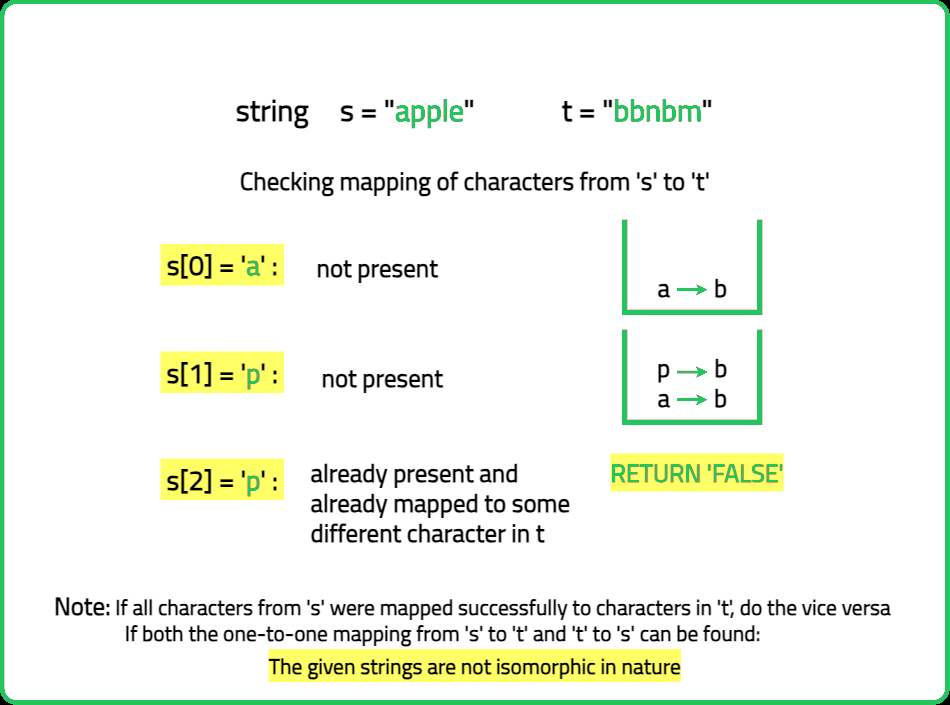12345678910111213141516171819202122232425262728293031323334353637383940
#include<bits/stdc++.h>
using namespace std;
class Solution {
public:
bool isomorphicString(string s, string t) {
// Arrays to store the last seen positions of characters in s and t
int m1[256] = {0}, m2[256] = {0};
// Length of the string
int n = s.size();
// Iterate through each character in the strings
for (int i = 0; i < n; ++i) {
// If the last seen positions of the current characters don't match, return false
if (m1[s[i]] != m2[t[i]]) return false;
// Update the last seen positions
m1[s[i]] = i + 1;
m2[t[i]] = i + 1;
}
// If all characters match, return true
return true;
}
};
// Main method for testing
int main() {
Solution solution;
string s = "egg";
string t = "add";
if (solution.isomorphicString(s, t)) {
cout << "Strings are isomorphic." << endl;
} else {
cout << "Strings are not isomorphic." << endl;
}
return 0;
}
1234567891011121314151617181920212223242526272829303132333435
class Solution {
public boolean isomorphicString(String s, String t) {
// Arrays to store the last seen positions of characters in s and t
int[] m1 = new int[256], m2 = new int[256];
// Length of the string
int n = s.length();
// Iterate through each character in the strings
for (int i = 0; i < n; ++i) {
// If the last seen positions of the current characters don't match, return false
if (m1[s.charAt(i)] != m2[t.charAt(i)]) return false;
// Update the last seen positions
m1[s.charAt(i)] = i + 1;
m2[t.charAt(i)] = i + 1;
}
// If all characters match, return true
return true;
}
// Main method for testing
public static void main(String[] args) {
Solution solution = new Solution();
String s = "egg";
String t = "add";
if (solution.isomorphicString(s, t)) {
System.out.println("Strings are isomorphic.");
} else {
System.out.println("Strings are not isomorphic.");
}
}
}
12345678910111213141516171819202122232425262728293031
class Solution:
def isomorphicString(self, s, t):
# Arrays to store the last seen positions of characters in s and t
m1, m2 = [0] * 256, [0] * 256
# Length of the string
n = len(s)
# Iterate through each character in the strings
for i in range(n):
# If the last seen positions of the current characters don't match, return false
if m1[ord(s[i])] != m2[ord(t[i])]:
return False
# Update the last seen positions
m1[ord(s[i])] = i + 1
m2[ord(t[i])] = i + 1
# If all characters match, return true
return True
# Main method for testing
if __name__ == "__main__":
solution = Solution()
s = "egg"
t = "add"
if solution.isomorphicString(s, t):
print("Strings are isomorphic.")
else:
print("Strings are not isomorphic.")
123456789101112131415161718192021222324252627282930313233
class Solution {
isomorphicString(s, t) {
// Arrays to store the last seen positions of characters in s and t
let m1 = Array(256).fill(0), m2 = Array(256).fill(0);
// Length of the string
let n = s.length;
// Iterate through each character in the strings
for (let i = 0; i < n; ++i) {
// If the last seen positions of the current characters don't match, return false
if (m1[s.charCodeAt(i)] !== m2[t.charCodeAt(i)]) return false;
// Update the last seen positions
m1[s.charCodeAt(i)] = i + 1;
m2[t.charCodeAt(i)] = i + 1;
}
// If all characters match, return true
return true;
}
}
// Main method for testing
const solution = new Solution();
const s = "egg";
const t = "add";
if (solution.isomorphicString(s, t)) {
console.log("Strings are isomorphic.");
} else {
console.log("Strings are not isomorphic.");
}
